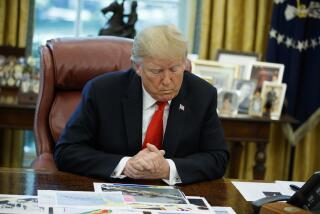Christopher Calls Resources Key
- Share via
STANFORD — Signaling a new priority for U.S. foreign policy, Secretary of State Warren Christopher in a speech at Stanford University on Tuesday called for a special emphasis on environmental protection, arguing that global peace and national security are increasingly dependent on the health of the world’s natural resources.
“Environmental forces transcend borders and oceans to threaten directly the health, prosperity and jobs of American citizens,” Christopher told an audience of about 1,500 students, faculty and public officials. “Addressing natural resource issues is frequently critical to achieving political and economic stability and to pursuing our strategic goals around the world.
“That is why we are determined to put environmental issues where they belong: in the mainstream of American foreign policy.”
Members of the audience, which included an array of science and public policy experts, called Christopher’s environmental message unprecedented by a secretary of state.
“I never thought I would live long enough to hear a secretary of state express so many of the concerns of the world’s scientific community and say that if we don’t address these issues we are going to be in deep, deep trouble,” said Paul Ehrlich, coauthor of “The Population Bomb” and founder of Stanford’s Center for Conservation Biology.
Among the goals Christopher set are attaining greater worldwide reductions in man-made emissions, known as greenhouse gases, which are suspected causes of global climate change; developing a strategy for conserving the world’s forests, and fostering international cooperation in the use and disposal of toxic chemicals.
In citing environmental disasters, such as deforestation in Haiti and drought in Somalia, as underlying causes of political upheaval, Christopher was formally acknowledging a school of thought that has been clamoring for recognition in foreign policy circles for several years.
An important goal of future foreign policy, he said, “is to confront pollution and the scarcity of resources in key areas where they dramatically increase tensions within and among nations.”
For policymakers concerned about environmental pressures, Christopher said, China may pose the most formidable challenges.
“With 22% of the world’s population, China has only 7% of its fresh water and cropland, 3% of its forests and 2% of its oil.”
He linked the decline of living standards and life expectancy in Russia to widespread pollution, and added that the survival of Russian democracy depends, in part, on environmentally safe technology that the United States can help provide.
Christopher said that sound environmental policy even figures into the war on drugs.
“To help combat drug trafficking and crime, we are encouraging sustainable agriculture as an alternative to the slash-and-burn cultivation of opium poppies and coca from Guatemala to Colombia.”
Christopher said the United States will soon be establishing “environmental hubs” in a number of embassies around the world to help other nations devise strategies that encourage economic growth without sacrificing precious resources.
He briefly outlined a series of initiatives by the State Department to help Russian leaders safely operate nuclear reactors and dispose of radioactive waste; to strengthen joint U.S.-Canadian efforts on behalf of clean water and flood control in the Great Lakes region; to expand sustainable development in China, and to work with Mexico on a new project to combat air pollution along the border.
Although Christopher’s remarks did not have a sharp partisan edge, his emphasis on the environment echoes a popular theme of the Clinton administration this election year. Looking to public opinion polls that show strong popular support for policies that protect the environment, the administration may hope to profit by drawing attention to the efforts of Republicans in Congress to weaken many environmental laws.
More to Read
Sign up for Essential California
The most important California stories and recommendations in your inbox every morning.
You may occasionally receive promotional content from the Los Angeles Times.










